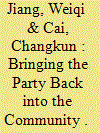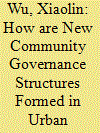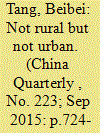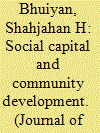| Srl | Item |
| 1 |
ID:
192184


|
|
|
|
|
| Summary/Abstract |
While burgeoning research on China's state–society relations has paid attention to the Party, little is known about how the Party interacts with diverse actors and involves itself at the grassroots level in a specific region. This article delineates Party-advancement strategies at the community level in Shenzhen since 2013. To reclaim its leading role at the grassroots level, the Party opted for “Party–government disaggregation” by framing community governance as a Party-building affair, separating the government's affairs from those of the Party and “kicking” the government out of the community. Under the rubric of “reshaping Party–mass relations,” the Party penetrated deep into the community by innovating a “centre-periphery” organizational system, absorbing community elites in a top-down way and using a “service delivery taking the lead” method in a reciprocal exchange. In the end, the Party-governance structure, in which Party–mass relations are at the core, was reframed in the communities.
|
|
|
|
|
|
|
|
|
|
|
|
|
|
|
|
| 2 |
ID:
161407


|
|
|
|
|
| Summary/Abstract |
Through interviews and comparison of practices in two Chinese cities, this article argues that local governments are forced to shift some of their excessive responsibilities to new actors. This produces a limited kind of pluralism: government organizations remain in charge of community governance.
|
|
|
|
|
|
|
|
|
|
|
|
|
|
|
|
| 3 |
ID:
142572


|
|
|
|
|
| Summary/Abstract |
China's urbanization has created a large number of urban villages which, although they have been transferred to urban administration, have maintained their collective economies. Using a comparative perspective, this article investigates how villagers, the village collectives and the urban administration organize community governance in three urban villages on the fringes of the cities of Guangzhou, Wuhan and Shenyang. The findings suggest that successful village collective shareholding companies play a leading role in community governance by providing villagers with economic and social welfare, subsidizing community administration services, and mobilizing residents. The comparative analysis also shows that village shareholding companies employ different mechanisms based on the varied histories of their village collective economies, the ability of the village collectives to mobilize resources, and the degree to which the village collectives are engaged in the grassroots administrative structure. The article argues that the “not rural but not urban” governance mode of the urban villages illustrates China's fragmented urbanization planning. At the same time, it illuminates the dynamics of state–society relations during China's urbanization and how landless villagers and village collectives respond to urban transformation by adopting different strategies to preserve their individual and collective interests.
|
|
|
|
|
|
|
|
|
|
|
|
|
|
|
|
| 4 |
ID:
109121


|
|
|
|
|
| Publication |
2011.
|
| Summary/Abstract |
This article explores the role of social capital in community development by focusing on two South Asian case studies drawn from India and Bangladesh. Both studies recognized social capital as a useful resource, which facilitates social interaction and promotes mutual support and cooperation and thus improves participants' livelihood through income generation, better community governance and capacity building. An important observation is that social capital yields superior outcome if it is used in line with the local conditions of a given society. The findings suggest lessons for policy planners, donor agencies, development practitioners, non-governmental organizations (NGOs) and civil society to use social capital as a resource in order to achieve sustainable community development.
|
|
|
|
|
|
|
|
|
|
|
|
|
|
|
|